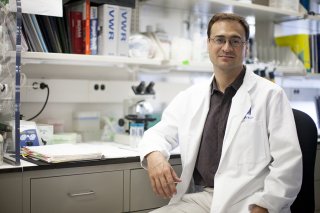You are here
Dr. Derek Braun

1. The basics: hometown, current city
I was born in Omaha, Nebraska and lived briefly in Chicago, IL. I mostly grew up in Madison, WI.
2. Do you identify as deaf, hard of hearing or another term?
Deaf
3. Your educational background: mainstream/school for the deaf; high school; college and major; graduate/medical school and major; additional training/education
I attended a variety of schools growing up, just like most other deaf people I knew. I attended the Omaha Hearing School, an oral program, for pre-K and K. For first and second grade I went to a school for intellectually disabled and emotionally disturbed children called St. Mary's in Chicago - the reason I was placed there is because I had two aunts who taught there. For the rest of elementary school, I attended hearing schools where I was the only deaf child in my classroom. For high school I was in a mainstreamed program with sign language interpreters. I learned to sign somewhat in high school, but mostly at Gallaudet.
My undergraduate degree was in computer science with a minor in mathematics, from Gallaudet. I obtained my Ph.D. in cell biology and molecular genetics from the University of Maryland and then did a four-year traineeship in cancer pharmacology at the National Institutes of Health in Bethesda, Maryland.
4. What about your field interests you the most?
I've always liked science in all forms. I've always liked analyzing and solving problems and playing with cool concepts and technology. I've always liked computers and they were my escape as a child when my brothers were watching television (very little was closed captioned in those days). I'm a geneticist but if I hadn't become a geneticist I'd certainly be working with science and technology in another field or form.
5. What barriers did you encounter in your education?
I don't think I saw any significant barriers until the end of high school, when my high school counselor appeared fully perplexed about what my career options could possibly be after college. I mostly encountered barriers in college and more so in graduate school. The recurring barrier that I encountered was the prevailing attitude that deaf people couldn't be successful in many fields, particularly in science, although technology was thought to be an exception because anyone could work on a computer without needing to communicate very much. In graduate school I also encountered resistance to providing sign language interpreters, but I honestly think that was much less of a barrier than the attitude that deaf people couldn't do it.
6. How did you overcome those barriers?
I toughed it out.
7. What advice would you give to others interested in pursuing a career in the science field?
I think good people skills, and emotional and social maturity and stability are underrated. These skills are critical to being successful as a scientist or physician. In the earlier stages of your career they help with networking, which opens up opportunities, which lead to further opportunities; and in the later stages of a career they help when one begins to take upon administrative or mentoring roles. For this reason, I think it's hugely beneficial to participate fully in the deaf community.
I think Gallaudet is a wonderful place for undergraduate school in the sciences because of the deaf science Ph.Ds and researchers we have, the opportunities here for doing original, mentored research with a deaf faculty member, and the truly rich social interaction and opportunities that occur here. Mentorship by a deaf individual who already has the job you want is important because we can teach you how to navigate the pipeline to get to where we already are.
For considering graduate programs and beyond, I would personally give priority to programs that are enthusiastic about taking upon a deaf student or trainee - because then you won't have to fight so hard to obtain interpreters, fight for opportunities such as teaching assistantships, and continually prove to disbelieving faculty that you really can do it. This frees up your energy for your studies, where they ought to be focused.
I think it's also important to consider your long-term social and emotional needs. Graduate school is a marathon rather than a short sprint. It's exhausting, and can be discouraging at times. Social and emotional support becomes critical. Will your graduate program be in a city where you have friends and family, for example?